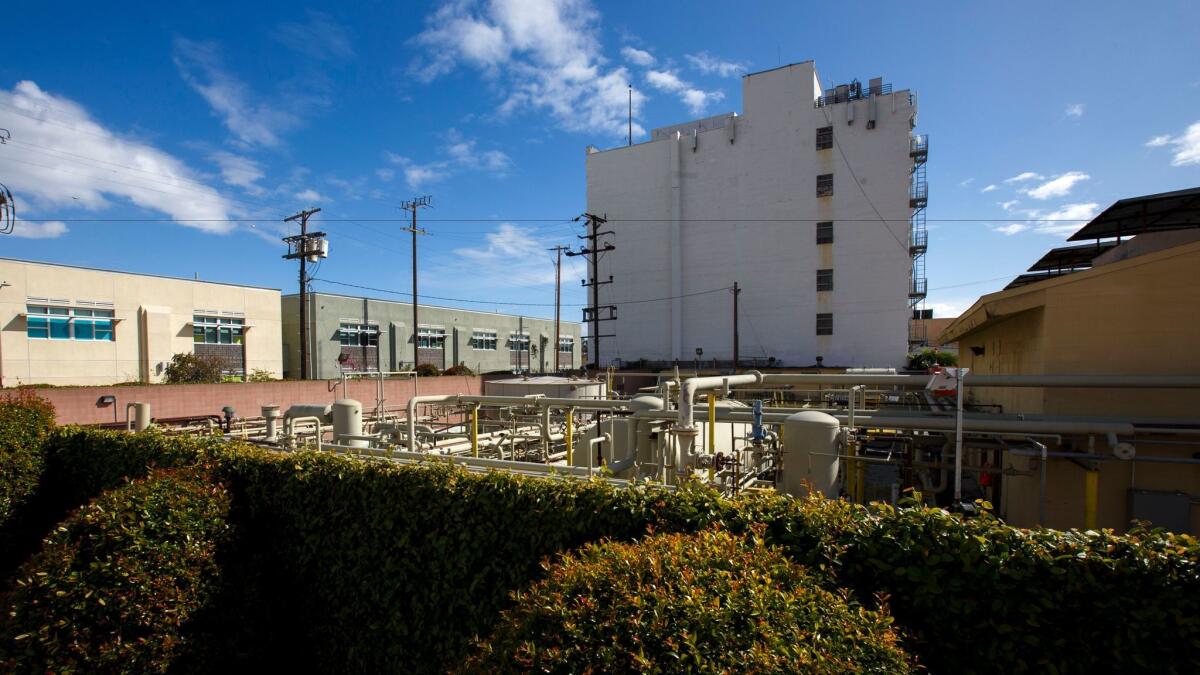L.A. oil-drilling site could be turned into affordable housing

- Share via
An oil company is floating tentative plans to shut down a drilling site next to a Los Angeles school and replace it with affordable housing.
The 4th Avenue site in Arlington Heights has been the focus of neighborhood activists, who worry that idle wells there could eventually deteriorate and leak chemicals into the air or groundwater. Residents have also demanded city action on alleged violations under the facility’s previous owner.
Now City Council President Herb Wesson says a new operator, Sentinel Peak Resources, has been talking with his office about closing the site and cleaning it up. No official plan has been drafted and details are scant, but Wesson said he was “unbelievably excited” about the idea, arguing it could pave the way to convert other local drilling sites.
“We are going to close that site and build affordable housing,” Wesson said, asserting that the company, not the city, would cover the costs of cleaning it up. “This is an unbelievable win for a very active community.”
Sentinel Peak Resources, which took over the roughly 1.1-acre site in December, now believes that affordable housing is the “best beneficial use” for the land, said Christine Halley, the company’s environmental health and safety director.
“It’s more compatible with the surrounding land use,” Halley said.
Remaking the site could be expensive. Plugging wells properly can cost an average of $100,000 to $150,000 per well and soil remediation can cost $10 to $20 per cubic foot, according to the Southern District of the state Division of Oil, Gas & Geothermal Resources. More than a dozen wells are arranged in a L shape on the site.
State regulators also caution against building over wells, warning that even a properly plugged well can leak in the future. “If someone is going to build on top of these sites, they’d better do their homework to mitigate the risks of methane accumulating inside of homes,” said Seth Shonkoff, executive director of the energy science and policy institute PSE Healthy Energy.
Wesson said he would not move forward with any project that placed residents at risk. Halley said it was premature to say how soon the site might be closed or when construction might begin. And she and Wesson also said it was too early to say what assistance — if any — the city might eventually offer to facilitate the project.
Neighborhood leaders said they were interested in closing and re-purposing the site, but are awaiting more details. They stressed that regardless of any plans, they still want the city to pursue their concerns about violations at the site, which Sentinel Peak Resources has so far brushed off.
“Change is welcome,” said Jeff Camp, president of the United Neighborhoods Neighborhood Council, which represents the area. “But there are laws and regulations in place for a reason — and to flout them only sets a precedent.”
Years after oil and gas production stopped at the 4th Avenue site, the neighborhood group became worried that leaving wells idle indefinitely could lead to environmental hazards and increase the risk that taxpayers would foot the bill for a cleanup. It prodded the Fire Department to exercise a rarely used code to demand that idle wells be either restarted or plugged.
Last year, instead of plugging them, Freeport-McMoRan Oil and Gas said it had revived the wells. Community members then questioned whether the company was genuinely resuming natural gas production at the site or simply trying to avoid the cost of plugging the dormant wells.
They also argued that the company had violated the law when it converted some wells so they could be used for gas production. In January, the city’s petroleum administrator weighed in, finding that the well conversions appear to have violated the municipal code and that the converted wells were still considered to be idle under city and state rules.
Freeport-McMoRan declined to comment on the alleged violations and referred questions to Sentinel Peak Resources. The planning department has repeatedly asked the new company to submit paperwork that would start the process of reviewing whether the 4th Avenue site is in compliance with city requirements.
Sentinel Peak Resources has resisted those demands, saying they are “unwarranted” and arguing that the wells had not been physically altered in a way that would require city approval. Planning officials say they are moving forward with a hearing despite its refusals.
Michael Salman, a West Adams resident who spearheaded efforts to plug the 4th Avenue wells, said he was troubled that Sentinel Peak Resources has been bucking city requests. He questioned whether the company had suggested plugging the wells in order to derail the planning department review — or to use the wells as a bargaining chip for other city concessions.
“Well site operators should not be allowed to evade regulatory authority simply by refusing to comply … or by making vague gestures toward possible resolutions,” Salman said.
Halley said that because plans to shut down the 4th Avenue site are not yet certain, Sentinel Peak Resources needed to keep its options open and respond to the allegations. Wesson said he didn’t think the budding plans would affect the review of the site and that he was committed to making sure that “business entities have to play by the rules.”
L.A. has an opportunity to fix the planning mistakes of the past, Wesson argued. If the city was being built from scratch, he said, no one would build homes or schools next to drilling sites.
“Maybe this will lead the way,” Wesson said.
Twitter: @LATimesEmily
More to Read
Sign up for Essential California
The most important California stories and recommendations in your inbox every morning.
You may occasionally receive promotional content from the Los Angeles Times.











